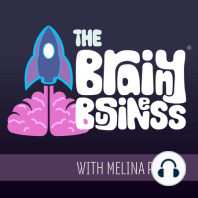48 min listen

337. The Role of Critical Thinking in Resisting Misinformation - Sander van der Linden
FromThe Brainy Business | Understanding the Psychology of Why People Buy | Behavioral Economics
337. The Role of Critical Thinking in Resisting Misinformation - Sander van der Linden
FromThe Brainy Business | Understanding the Psychology of Why People Buy | Behavioral Economics
ratings:
Length:
49 minutes
Released:
Nov 2, 2023
Format:
Podcast episode
Description
In this episode of The Brainy Business podcast, social psychologist and Director of the Cambridge Social Decision-Making Lab, Sander van der Linden, joins host Melina Palmer to discuss the role of critical thinking and emotions in resisting misinformation. Sander's extensive research on the influence of repetition and the illusory truth effect make him a trusted authority on the subject. The conversation serves as a valuable resource for critical thinkers concerned about misinformation in today's digital landscape. Van der Linden explains how repetition can lead people to question their own knowledge and accept false information as true, highlighting the illusory truth effect. He also discusses the conjunction fallacy and the self-sealing belief system of conspiracy theorists. The episode delves into the concept of inoculation as a strategy to combat misinformation, providing insights on how to build cognitive antibodies to resist manipulation. Overall, the conversation offers practical tips and insights for improving critical thinking skills and navigating the complex world of misinformation. In this episode: Gain a deeper understanding of the pervasive impact of misinformation in today's society. Discover how the illusory truth effect influences belief formation and the way we perceive information. Explore the complexity of conspiracy theories and the conjunction fallacy, and how they can contribute to the spread of misinformation. Learn about the powerful strategy of inoculation as a means to combat misinformation and manipulation. Understand the crucial role that critical thinking and emotions play in resisting misinformation and making informed decisions. Show Notes: 00:00:00 - Introduction, Sander is a professor of Social Psychology at the University of Cambridge. He studies how people process misinformation and how to combat its spread. He shares his expertise with governments, public health authorities, and social media companies. 00:04:41 - The challenges of researching historical accounts Sander discusses the difficulties of researching historical accounts for his book. He had to navigate competing historical viewpoints and verify the accuracy of information. He shares the example of a disputed document regarding Mark Antony's will as an example of the challenges faced in historical research. 00:09:01 - Writing process and structure of the book Sander talks about his writing process and the structure of the book. He waited until he had enough data and case studies before starting. Once he had the general structure and outline, he began filling in the individual chapters. Sander emphasizes the importance of having a clear direction before starting to write. 00:12:40 - The impact of misinformation on decision-making Sander explains how misinformation can influence decision-making. He discusses the cognitive biases that help our minds accept false information. 00:15:47 - Illusory Truth Effect and Repetition, Repetition of false information can lead people to believe it, even if they have prior knowledge that contradicts it. This is known as the illusory truth effect. Examples include misattributing the ark to Moses instead of Noah, and the power of the "big lie" technique used by Hitler. 00:18:10 - Continued Influence of Misinformation, Misinformation can persist and strengthen over time, making it difficult to correct. The continued influence of misinformation is similar to how memories are connected in a social network. Once a false belief is established, it can be challenging to change it, as seen with the autism vaccination link myth. 00:19:49 - Conjunction Fallacy and Conspiracy Theories, The conjunction fallacy refers to the tendency to believe that multiple conspiracy theories are more likely to be true than a single one. People often endorse multiple conspiracy theories simultaneously, even if they are mutually exclusive. This is due to a self-sealing belief system where one theory serves as evidence fo
Released:
Nov 2, 2023
Format:
Podcast episode
Titles in the series (100)
6. How To Sell From The Stage: Last week, I talked about , you might want to listen to that episode before we dive into today’s episode about how to sell from the stage. Both are built on the same foundation. In the truth about pricing “it’s not about the cookie,” there... by The Brainy Business | Understanding the Psychology of Why People Buy | Behavioral Economics